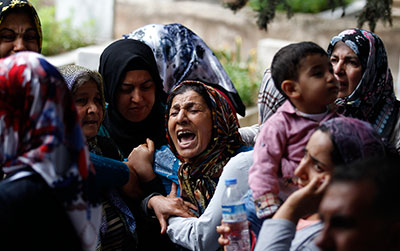When twin car bombs shook the district of Reyhanli in Turkey’s southeastern province of Hatay near the Syrian border last Saturday, killing at least 51 people and wounding dozens of others, a local court issued a gag order on all news coverage of the attack. The ban was unprecedented in scope and in the way by which it came about.
Within hours of the bombing–in a busy shopping area in Reyhanli, the temporary home of thousands of Syrian refugees–police in Hatay, Istanbul, and Ankara visited newsrooms and presented the court order to media managers to ensure they heed to it. The order banned “every type of voice and visual recording, feeds, print and visual media [records], and data on the Internet” about the Reyhanli incident. The order also banned sharing of information about “the event scene, the dead and the wounded at the event scene, and the contents of the event.”
To further ensure that the order was widely disseminated, the state broadcasting regulator RTÜK also announced it. Even though few of Turkey’s media adhered to the ban, the very fact that it was passed deepens concerns over the state of press freedom and freedom of information in Turkey, and casts further doubts on whether Ankara is genuinely prepared to keep to its international commitments on the issue.
At the heart of the problem is Turkey’s flawed legal framework, which allows for authorities to censor the media; as well as the authorities’ instinct to control the press rather than let it do its job.
The mechanics of the ban were as follows:
After the bombings, the Chief Republic Prosecutor’s Office of Reyhanli, which is responsible for the investigation into the attack, filed a claim with the Reyhanli Penal Court of Peace to ban all news outlets from covering the incident, alleging that coverage “violates the secrecy of the investigation,” news reports said.
The court approved the claim and banned all news, on any platform. As justification, the court cited, in part, Article 3 of Turkey’s Press Law, which allows for restrictions on news media when the “public health and morals, national security, public order, public safety, and the unity of the land” are at stake. It was not clear how the ban was meant to be enforced.
Independent and opposition print and online media immediately challenged the gag order, calling it an attempt at blanket censorship. The vibrant Turkish Twittersphere swirled with comments on the issue. “A penal judge cannot act as if he is a lawmaker,” tweeted Adem Sözüer, dean of the Law Faculty of Istanbul University, on Monday. “Basic rights cannot be limited by law,” Sözüer said. However, television and radio stations, which can be shut down on the order of RTÜK, largely adhered to the ban.
Although the ban was technically imposed by a court and not by the government, leaders of Recep Tayyp Erdoğan’s AKP party quickly spoke out in support of it. Interior Minister Muammer Güler, Justice Minister Sadullah Ergin, Health Minister Mehmet Müezzinoğlu, Hatay Governor Celalettin Lekesiz and Deputy Prime Minister Beşir Atalay held a joint press conference on Saturday on the Reyhanli attack. Of the gag order, Ergin said: “The matter of the news ban in such events is for both protecting the safety of the investigation and to prevent the public’s psychology from being negatively influenced.”
While the news media were gagged, government officials continued to talk to the press about the bombing–indicating that all news is not created equal. Evidently, government-sanctioned information is allowed; independently gathered information is not.
Hüseyin Çelik, deputy AKP leader, made these statements on NTV television on Monday: “Many times journalists produce news with background stories, things they hear from each other [and] what someone on the street says [because] they have a concern for scooping [the competition].” He said the news blackout was necessary for the investigation into the bombing to proceed unobstructed. Puzzlingly, he added, “Such precautions were taken in the USA during the 9/11 attacks.”
The latter statement, of course, is false. Furthermore, time and again, the record has shown that news blackouts do not prevent rumors and speculation but breed them. As such, blackouts are not only unnecessary–they are harmful.
In the end, the news ban was scrapped Thursday on appeal. It is unclear who filed the appeal, but a court in Hatay lifted the ban, just like the Reyhanli court had imposed it. Perhaps Turkish authorities figured out that, in the digital era, information is impossible to stifle.
